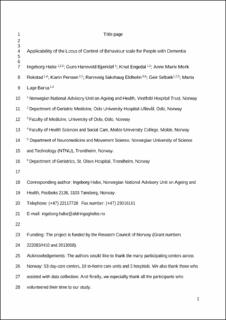| dc.description.abstract | Objective: To investigate the applicability of the Locus of Control of Behaviour scale (LoCB) for people with dementia. Method: A sample of 534 participants with dementia (78.4 mean age, 58% female) were included. Assessment included the LoCB, the Montgomery–Aasberg Depression Rating Scale (MADRS), the Mini-Mental Status Examination Norwegian revised (MMSE-NR) and the Instrumental Activities of Daily Living (I-ADL). Completion percentages and internal reliability of LoCB were examined for predefined MMSE-NR groups (0–4, 5–9, 10–14, 15–19, 20–24, 25–27, and 28–30). Factors associated with completion were analysed, and a principal component analysis (PCA) of the LoCB was performed. Sum score and component subscale scores were compared to MADRS and MMSENR scores. Results: In total, 234 participants completed the LoCB. Completion percentages ranged from 74% (MMSE-NR 28–30) to 0% (MMSE-NR 0–9). Internal reliability was between 0.80 and 0.72 in groups with MMSE-NR > 9, except in MMSE-NR 20–24 (0.52). Age, MMSE-NR and education were associated with completion. The PCA yielded three components – powerful others, internal, and luck/ fate – with explained variance of 41.3%. Participants with MADRS > 7 scored higher on the LoCB sum score, powerful others and internal subscale scores. No difference was found regarding the luck/fate subscale score. MMSE-NR did not affect LoCB scores. Conclusion: Older age, less education, and more cognitive impairment decreased the likelihood of completion. However, psychometric test results indicate that those who completed the LoCB understood the questions, even with severe cognitive impairment. We conclude, therefore, that the LoCB is applicable for investigating control orientation among people with dementia. Keywords: dementia, depression, locus of control, psychotherapeutic interventions | en_US |
